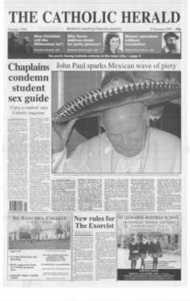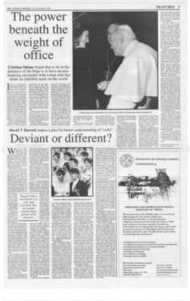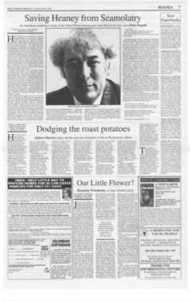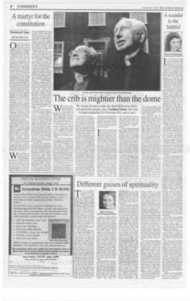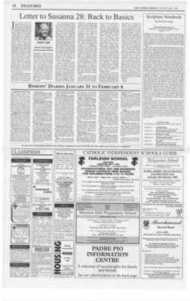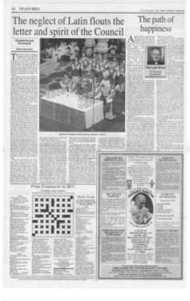Page 9, 29th January 1999
Page 9

Report an error
Noticed an error on this page?If you've noticed an error in this article please click here to report it.
Tags
Share
Related articles
The Man Who Showed That Aristotle Was Out Of Date
The Founder Of Modern Science: A Misrepresentation
Science And Faith
Why Modern Science Needed The Nicene Creed
A Scientist Centuries Ahead Of His Time
From Dr W E Makin Sir, Peter Hodgson tells us
that John Buridan is called "the founder of modern science". His claim to this title rests on three facts.
1 He argued the world was created (and not eternal) 2 He "corrected Aristotle."
3 He devised an impetus theory of physics.
Yet we read, in the Oxford Companion of Philosophy: "He defended the Christian doctrine that the universe must have a beginning, attacked Aristotle's dynamics (as later did Galileo) and denied that a thrown javelin continued to move because propelled by the air behind it. He suggested instead a theory of impetus."
These words do not come from the entry on John Buridan, Professor in the Sorbonne in the fourteenth century. "He" refers to quite a different John — John Philopponous, a Greek who lived exactly eight centuries before Buridan. Yet both appear to have exactly the same claim to fame. Was there any connection between these two Johns?
Peter Hodgson, with disarming honesty, admits that Buridan pinched his anecdote about the donkey from an earlier Islamic writer. He is strangely amnesiac about the fact that all Buridan's other ideas came from a similar source. Buridan, like most scholars in the Latin West at that time, was totally unable to read Greek. This was not only the language of Philop ponous but the language in which nearly all science was written.
Buridan accessed Philopponous' ideas, at third or fourth hand, from Latin translations of Arabic works by long dead Islamic scientists. These continued to be far more "modem" than anything in the Christian West, for another century. Does this ability to popularise prove Buridan "laid the foundations of modern science"?
There's more! Peter Hodgson conceals the immense cliff between impetus theory and Newton's first law of motion. Medieval impetus theory fell far short of Newton's realisation that "an object will continue in a state of rest or uniform motion unless acted on by an external force". Buridan, far from "correcting Aristotle", never thought to question the conventional Aristotelian framework of matter and space. This remained official Church teaching long after Galileo.
Historically, it is far from certain that impetus theory "inspired" Newton's physics. In the work of the Roman Lucretius (first century before Christ) we find a thought experiment as momentous as anything in Einstein. A javelin, if hurled into empty and infinite space, will go on for ever. This is far closer to modem physics than anything in Buridan, Galileo, Beekman, Gassendi and Newton — four founders of modern dynamics — all studied Lucretius's writings. Can Dr Hodgson show that any of them even used Buridan's name?
Why is he so keen to tell us about Buridan's ass while editing out a Christian heretic (Philopponous), the Islamic scientists and the pagan Lucretius?
Because he is peddling an agenda about Catholic orthodoxy and science which these facts don't seem to fit. Lucretius was an Epicurean — roundly condemned by the Church as an atheist (though he had died long before the gospel was preached). Epicurus had been Aristotle's great rival and contemporary. Christians and Moslems alike suppressed Epicurus's writings, because of their alleged materialism. So it appeared, by Buridan's day, that Aristotle had a monopoly on scientific truth. When Lucretius' only surviving MS was rediscovered, at the Renaissance, two Church councils solemnly anathematised it. Galileo and Newton both kept their debt to Lucretius's atomism and dynamics a close secret.
The Church has nothing to fear from persecution, whether by pagans or communists. That can only make us stronger. The main obstacle to world-wide evangelisation is the legacy of all these selfappointed spin-doctors, down the ages. The Holy Spirit does not need their sophisticated smoke and mirrors.
Yours faithfully WILLIAM E MAKIN Great Barford, Beds.
blog comments powered by Disqus


